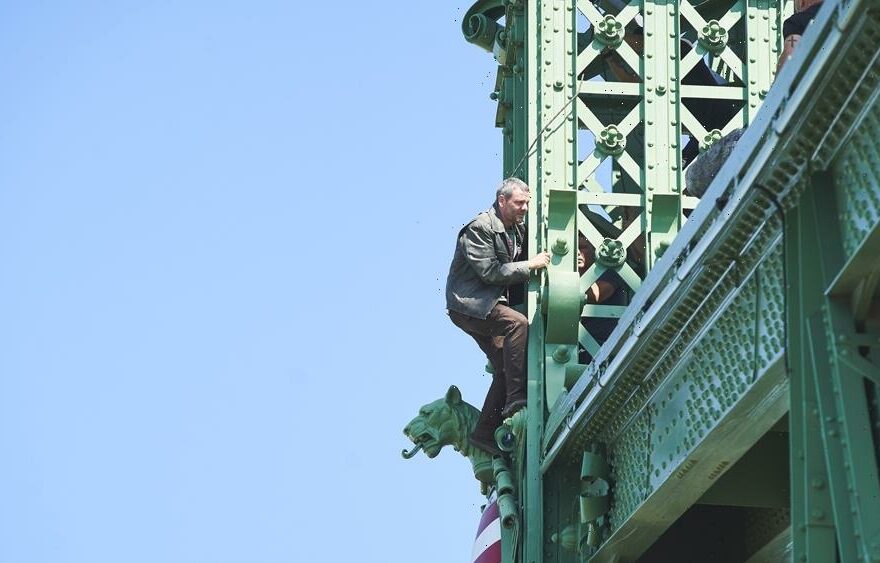Hungarian director András Fésős is in post-production with his sophomore feature “Rise Up and Walk,” starring Romania’s Bogdan Dumitrache, who won best actor prizes at Locarno with “Best Intentions” and San Sebastian with “Pororoca,” Film New Europe reports.
The film tells the story of a father and son’s difficult reunion, and involves several spectacular firefighter rescues.
Sándor Félix becomes the guardian angel of those who want to end their lives. However, not everyone in town is enthusiastic about his selfless work. After the death of his mother, Félix’s son Kristóf became estranged from his father. He makes videos of depressed people, who have given up hope.
“Beyond the fact that it looks into the depths of the human soul and dissects such a difficult subject as suicide, the film tells a life-affirming story about our times which is intended for a wide audience. From the beginning, I tried to emphasize hope and the power of love through the story of a father and his son,” Fésős said in a statement. Fésős wrote the script with Balázs Maruszki.
This is Dumitrache’s second Hungarian-speaking film after “Spirál,” directed by Cecilia Felméri.

Félix, the son, is portrayed by Olivér Börcsök, in a first leading role in a film. He previously appeared in TV series “The Teacher,” as well as in the feature film “Seven Small Coincidences.”
Barnabás Hutlassa is producing through Film Force. Péter Szatmári is the DoP.
The 30-day shoot, which wrapped at the end of June, took place in several locations in Budapest. It received 1.1 million Euros production grant from Hungary’s National Film Institute.
Fórum Hungary will release “Rise Up and Walk” in Hungary next year.
Doc ‘Fiume O Morte!’ Wraps
Igor Bezinović has finished his two-year shoot for feature documentary “Fiume o morte!” The Croatian/Slovenian/Italian coproduction centers on Italian poet Gabrielle D’Annunzio.
The film reconstructs the events in which D’Annunzio, accompanied by about a thousand rebellious Italian soldiers, captured the Croatian city of Rijeka in September 1919, and declared it his own micro-nation. This was followed by a short period in which Rijeka became a haven for artists and free thinkers, but also a place where the idea of nationalism flourished. Following bloody clashes in January 1921, the regular Italian army expelled D’Annunzio, but many ideas that emerged during his Rijeka episode were seen later in Mussolini’s regime.
The DoP was Slovenia’s Gregor Božič, who directed “Stories from the Chestnut Woods,” last year’s Slovenian Oscar candidate.

The shoot took place in Rijeka and Trieste in Italy, in D’Annunzio’s residence Vittoriali degli Italiani in Gradone, near Lake Garda in Italy, and in the Slovenian and Italian Karst region.
“Fiume o morte!” is produced by Vanja Jambrović and Tibor Keser through Restart in Croatia, and coproduced by Marina Gumzi through Nosorogi in Slovenia, and Erica Barbiani through Videomante in Italy. The film is supported by the Croatian Audiovisual Centre with 105,000 Euros, Creative Europe – MEDIA with 25,000 Euros, Eurimages with 140,000 Euros and RE-ACT with 8,000 Euros.
The premiere is planned for the second half of 2023 or the beginning of 2024.
Zdeněk Jiráský in Post-Production With ‘I Don’t Love You Anymore’
Czech director/writer Zdeněk Jiráský is in post-production with his feature film “I Don’t Love You Anymore,” a Czech/Slovak/Romanian coproduction about two kids on the run. The project participated in First Cut Lab at this year’s Karlovy Vary Film Festival.
Marek, 13, who hates his mother’s boyfriend, is constantly shooting and posting videos online. These impress Tereza, 12, “a good family girl.” Together, they start filming risky situations that they stage. Then Tereza suggests they run away from home. They stage ever tougher videos and pretend Marek kidnapped her. After Marek calls Tereza’s mother, there is no way back. They buy train tickets to go as far as possible and end up in Bucharest, in a dirty apartment-block neighborhood, stealing food.

“The concept of this unconventional road trip of two children is rooted in the tradition of verite-ism, which demands observation rather than staging. The low-budget method assumes a minimal crew which works with maximum concentration to develop and create the best possible conditions for two 13-year-old children whose performance is crucial to the result. The film will be partially based on improvisation,” Zdeněk Jiráský said in a statement.

The film is produced by Jordi Niubó through i/o post (Czech Republic), and coproduced by Arina film production (Slovakia) and Tangaj Production (Romania).
The project is supported by the Czech Film Fund, the Slovak Audiovisual Fund, the Czecj Ústi Region, and Sony Europe.
The total budget is 500,000 Euros.
The shoot started on March 1 and wrapped on May 30.
This article is published in partnership with online news service Film New Europe, which covers film and TV industry news from across Central and Eastern Europe.
Source: Read Full Article
